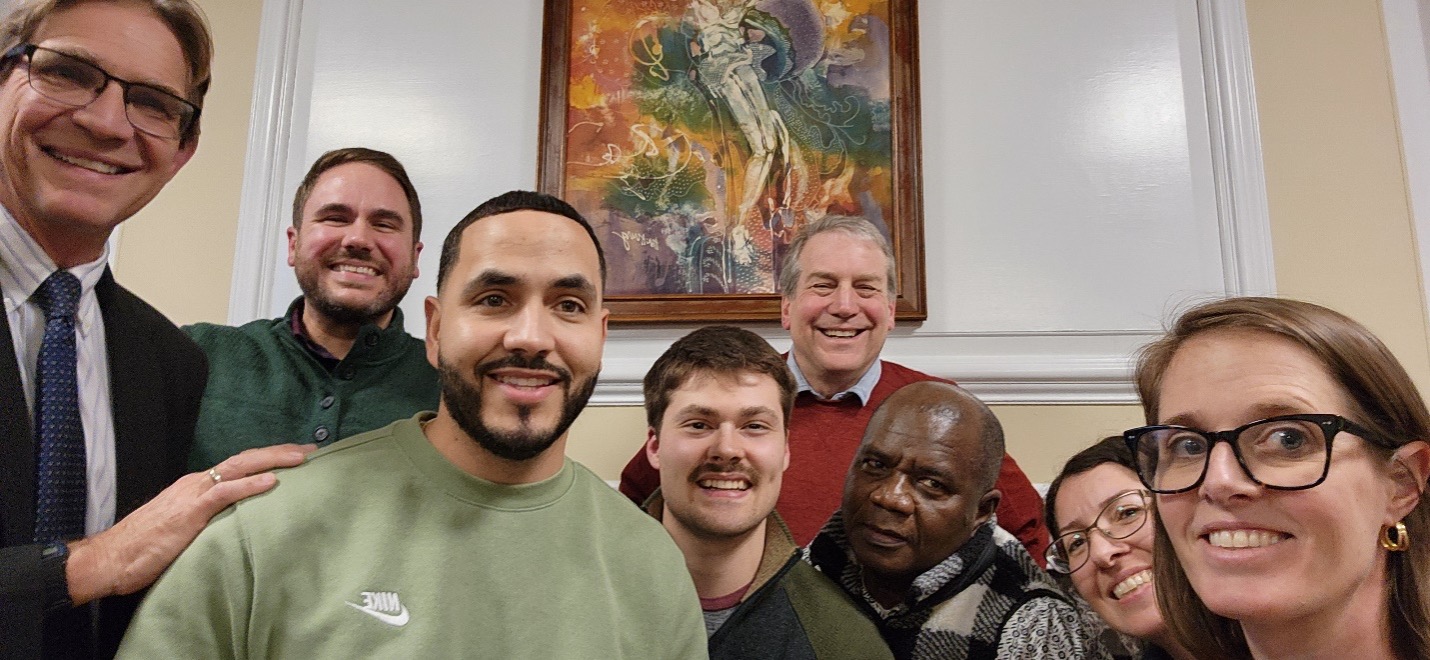Attentiveness: Spirituality for Mission
 The picture above reflects something of the joy of the resurrection. Our friendships and joy come from Christ’s victory on the cross.
The picture above reflects something of the joy of the resurrection. Our friendships and joy come from Christ’s victory on the cross.
I taught twenty-five students two weeks ago. Seven came to the Hamilton campus for class—one flew in from Hawaii. Others were scattered, zooming in from one predominately Muslim country, Haiti, Hollywood, and various other places in North America.
It was a fascinating time when we studied theological developments in the early church, councils, and patristic spiritual theology, which led to a discussion of the rise of Islam. The robust discussions flowed with great input from students coming from so many different types of churches and cultural and geographic contexts. As the picture above indicates, there was a lot of joy.
An important connection came about, providentially, from the class and the subject matter: spirituality for mission. I think it was reading the fascinating dialog from 781 between the Persian Patriarch Timothy I and the Caliph Mahdi that pulled it all together for us.[1] Timothy was a bright and wise patriarch with a zeal for mission. In this ancient two-day dialog—of which we read eleven pages—the Patriarch was very thoughtful, as well as remarkably respectful and patient in his response to the questions asked by the Caliph. Three threads came together for us: the importance of Trinitarian theology, the importance of knowing who Jesus is, and the importance of living our lives “in Christ.” Before we talked about the ancient Christian-Muslim dialog, we listened to a song “Who is this Jesus,” written and sung by a former Gordon-Conwell staff, Caroline Cobb. Music, Trinitarian theology, spiritual theology, and relations with Muslims were the elements of a memorable educational experience.
The students brought the course material to life.
The class was three hours Friday night, then seven hours on Saturday. It left me both exhausted and joyous and was a remarkable learning experience. I would say that for many of us it was more than a class. It was an experience that I wanted to tell my wife about and that I wanted to share with others.
I am a seminary president who is excited about how lives can be changed in good hybrid classes: learning and studying in person and online. I am a both/and type of guy who has experienced both hybrid and residential (in-person) learning and is leading a seminary that will continue to improve in both.
Why do I do this? Why am I so excited about a marathon teaching session? Because I could almost hear lives changing. The day before the class, a student in a Muslim country was witnessing to young Muslim men. He was further equipped as he learned so much more about the history of Muhammad, the rise of Islam, and Muslim beliefs about Jesus. Another student was raised in a similar context in Saudi Arabia. She brought her experience from youth into the class and then began thinking more about preparing university students for Christian witness to Muslims.
What we do is so important, but it is especially important when the learning is deep and formative. This happens when we stay in our contexts for most of our learning and then step away briefly. But it also happens when faculty is attentive to diverse students and their contexts even as we interact with the course material.
I have a great job, a great calling, wonderful students, and a marvelous Savior. So, when so much seems to be in chaos, my heart is full of thanksgiving this holy season.
[1] “Apology of Patriarch Timothy of Baghdad before the Caliph Mahdi” in John Coakley and Andrea Sterk eds., Readings in World Christianity, Volume I: Earliest Christianity to 1453. (Maryknoll, NY: Orbis Books, 2004), 231-242.
 Dr. Scott W. Sunquist, President of Gordon-Conwell Theological Seminary, is author of the “Attentiveness” blog. He welcomes comments, responses, and good ideas.
Dr. Scott W. Sunquist, President of Gordon-Conwell Theological Seminary, is author of the “Attentiveness” blog. He welcomes comments, responses, and good ideas.